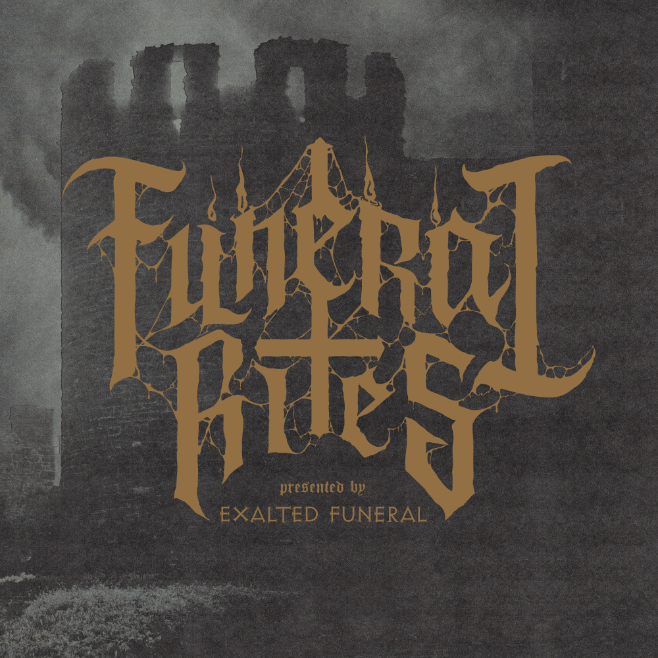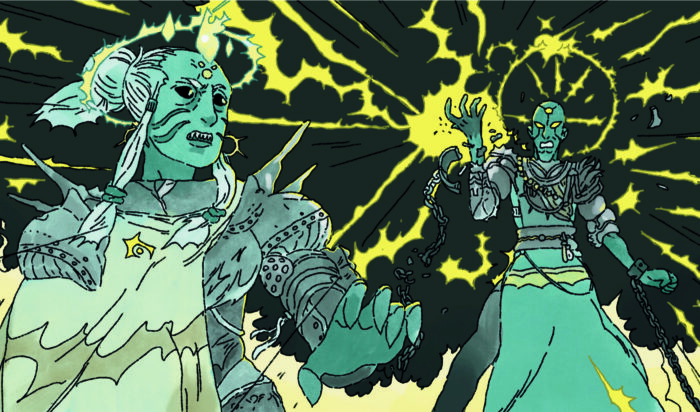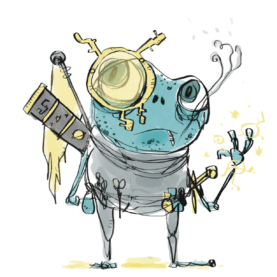
Daily Commute: An Examination of Arkos and The Forest Primordia
This feature is a reprint from Unwinnable Monthly #181. If you like what you see, grab the magazine for less than ten dollars, or subscribe and get all future magazines for half price.
———
This series of articles is made possible through the generous sponsorship of Exalted Funeral. While Exalted Funeral puts us in touch with our subjects, they have no input or approval in the final story.

The train is crowded today. You normally hop on at first light and head into the city to see if any of the high and mighty will spare some coin in exchange for an odd job. It’s normally a fairly uneventful commute, but there’s a crackle in the air today.
It isn’t every day that you come across a game where a major mechanic is navigating the perils of a subway ride across town, but the importance of narrative seeps its way through every mechanic of both Arkos and its sister project, The Forest Primordia, both based in the Troika! system. While one might argue that narrative is always inherent to the mechanics of TTRPG design, the attention to detail was a conscious effort on the part of creator John Kordosh, who wants his players to focus on the events unfolding around them, rather than counting metrics for meta-game functionality:
When characters hop on the subway in Arkos, they’re not on the train for “half an hour,” they’re on there for the peaceful entrance of a group of obsidian elves, the mystic lizards leisurely taking their seats, and the clockwork beasts setting up to clean the train inside and out.
This tendency toward abundance and a sense of a world much larger and more complex than what you are glimpsing as a player (or even a Game Master) suffuses the entirety of the experience of these zines. Kordosh’s inspiration for the pieces range far and wide, from the ultra-traditional to the high literary (as someone with an English background, I greatly appreciated the nod to the mind-bending works of Argentine author Jose Luis Borges, one of my personal favorites). This sense of excess and of everything-everywhere-all-at-onceness gives not only the play of the games but the literal text of the zines a rich cacophony. Each page is crammed so full of information (tables on tables on tables, helping less self-directed GMs map their experiences) that it can be easy to get lost in the muchness. The most challenging aspect of this experience, it seems, is figuring out how much is too much to put into a session or campaign.

Kordosh describes the two zines as a duality: Arkos exists as a monument to Law and Order, with the action taking place in an orderly city complete with functioning public transit. The Forest Primordia, on the other hand and as its name suggests, indulges itself in the chaos of going off the edge of societal maps. Thus, while both share obvious design sensibilities, Arkos is more like a spiritual counterpart to Primordia than any sort of expansion or formalized sequel. Even though the games outline two ends of a spectrum, looking at them both together really exemplifies how one cannot exist without the other – the order of the mechanics must always be countered by the chaos of player action, and the GM’s authority over the story can always be unseated by a simple roll of the dice.
The car stops, and the doors open. Before the crowd can begin to trickle out, a squad of goons with badges muscles its way through, to stand in the center aisle. Great. You hope against hope that the worst they’ll do is rifle through some bags. You’re really not in the mood for a full duel this early. But if selected, you cannot refuse.
Perhaps continuing to play with the idea of letting narrative rise naturally from a multiplicity of options, the game also provides players with curated Spotify playlists via links in the frontmatter. These playlists appear to function both as ambiance for play sessions and Kordosh’s development diary:
A few of the game’s Backgrounds have been directly inspired by specific songs and their lyrics. The Dreamscar Knight (Thee Oh Sees’ “The Dream”), the Soulbroken Gunsavior (Portishead’s “Machine Gun”) and the Abyssal Mythcrusher (Negative Scanner’s “History Lesson”) were all born from me listening to these songs over and over again and turning the lyrics into game mechanics and lore.

The games, thus, are a full sensory experience – listening to the paired playlist while scribbling out notes for a session lends the GM an extra layer of understanding. You don’t just feel like you know what you’re doing – you grok it. Similarly to the depth of content, however, more discerning GMs may find it overwhelming to map songs on the lengthy playlists to specific narrative beats. While Kordosh describes the game as “table-ready,” I can easily see potential for marathon prep sessions prior to play.
Another place where the game presents you with an embarrassment of riches is in the character archetypes. Leaning even further into the juxtaposition of order and chaos, there are several roles in the game with chance built in, especially in The Forest Primordia. Of particular interest is a class called the Dreamscar Knight, who wakes up each morning with a new mysterious trait, ranging from dyed hair to the ability to dream their way beyond the clutches of death. When asked about character designs and how people should approach role-playing within the world, Kordosh replied:
There’s something about the specificity of Troika! backgrounds that, for me, give a real sense of freedom. Focusing in on one or two elements can explode out into a fully-fledged character when you ask interesting and generous questions.

This added randomness tries to keep the player from falling into the routine of the role – you can’t put your play on autopilot when your character is different every day. Other characters have random chances for items or to play the in-universe economy for boons, so no matter your chosen playstyle, there’s some chaos built in. Kordosh intends to build out his work in a final game to finish the trilogy, which promises similar themes in yet a third locale.
Both Arkos and The Forest Primordia are lush, complex worlds that will give the player much in return, should you take the time to unlock their secrets and immerse yourself in the abundance presented to you. In this way, the games accurately reflect not just their inspiring source material, but the nature of our daily lives. There is wonder and adventure as something as simple as riding the subway, if you only know how to pay attention to it.
The head thug stomps through the car, eyeing passengers. He passes by a nervous mother and her child, an old man who is either asleep or very good at faking it, and a young merchant wearing a coat he could afford to buy but not, apparently, to have tailored. Finally, the squad reaches the end of the car, where you’ve attempted to make yourself small. The man (maybe, you can’t be sure) stops in front of you. You can’t see his eyes behind the visor, but you know where his gaze lies. A hand extends, index finger pointed. Guess you’re doing this, then. You stand, setting your pack on the seat next to you. You don’t know why, but for some reason, today you feel lucky.
Just another day in the city.
* * *
The Forest Primordia is available now from Exalted Funeral. Arkos will be along soon.
———
Emma Kostopolus loves all things that go bump in the night. When not playing scary games, you can find her in the kitchen, scientifically perfecting the recipe for fudge brownies. She has an Instagram where she logs the food and art she makes, along with her many cats.




